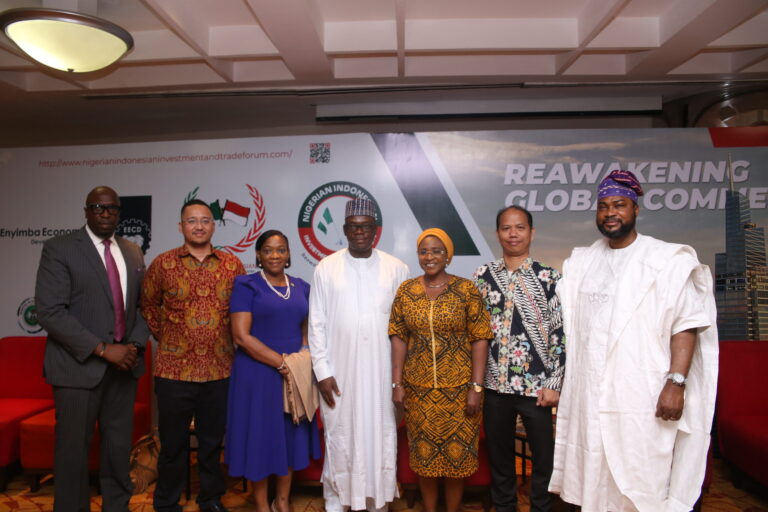Twenty-seven years after its inception, the Nigeria-Indonesia Chamber of Commerce and Industry (NICCI) has not only elevated bilateral trade but has also significantly reshaped how Indonesians perceive Nigerians.
Speaking during an interactive session held on Thursday, June 5, 2025, at the Port Harcourt Chamber of Commerce, Industry, Mines and Agriculture (PHCCIMA), NICCI President Ishmael Balogun described the transformation that has occurred over the years. The event was organized by Chinyere Nwoga, the first female president of PHCCIMA, and brought together stakeholders from both chambers.
Balogun, widely recognized as a key figure in fostering trade relations between Nigeria and Indonesia, highlighted that approximately 300,000 Nigerians currently live and engage in business in Indonesia. While some individuals initially cast a negative shadow on Nigeria’s reputation abroad, he said NICCI’s deliberate efforts have reversed these impressions.
“Today, Indonesians recognize a new face of Nigeria—people who are professional, ethical, and law-abiding,” Balogun said. Remarkably, not a single defection has been recorded during NICCI-organized trade missions. “The stereotype of Nigerians only seeking to ‘japa’ [flee the country] has been debunked. Many of us are thriving in Indonesia with no desire to relocate elsewhere,” he added.
Balogun also revealed NICCI’s next goal: securing visa-on-arrival (VOA) privileges for Nigerians traveling to Indonesia—a move he believes is now within reach, given Nigeria’s clean track record.
The Resurgence of NICCI
NICCI was officially established in 1997, but within two years, it became inactive. When Balogun took over as president in 2019, the chamber existed in name only—no staff, no physical office, no online presence, and zero membership.
Treating it like a start-up, he began rebuilding from scratch. Today, NICCI boasts over 130 corporate members, 70% of whom are Nigerian-owned businesses, while 30% represent Indonesian interests.
Balogun, who has been engaged in business with Indonesia since 2012, recalled that Nigeria’s informal trade with Indonesia had previously gone unrecorded, due to a lack of documentation and formal channels. In 2019, he spearheaded an awareness campaign encouraging Nigerian traders to process their transactions through banks and regulatory systems.
These efforts paid off quickly. From a trade volume of $1.9 billion in 2019, the figures climbed to $2 billion in 2020, making Nigeria Indonesia’s top trading partner in Africa. By 2021, bilateral trade rose to $2.7 billion and reached $4.7 billion by 2022.
Trade Dynamics and Port Harcourt’s Strategic Role
Port Harcourt’s importance in this partnership is underscored by its oil wealth. Indonesia remains a major buyer of Nigerian crude oil, importing no less than $2 billion worth annually. In return, Nigeria imports a wide range of goods from Indonesia—including electronics, pharmaceuticals, household products, and food items.
One of the most recognizable Indonesian exports in Nigeria is Indomie, which has become a household staple. The success of the brand led to local diversification, birthing popular products like Power Oil and chin-chin. Other notable collaborations include Orange Drugs and the local production of Delta Soap after a government ban on soap imports prompted Indonesian partners to establish a factory in Ilupeju, Lagos.
Growing Institutional and Governmental Support
NICCI has expanded its influence by actively engaging both governments and private sectors. Trade exhibitions and investment forums now involve key ministries such as Trade, Foreign Affairs, Health, Transportation, Agriculture, and agencies like NIPC and NEPC.
For the upcoming Nigerian-Indonesian Investment and Trade Forum in Jakarta, NICCI has secured backing from the office of Nigeria’s Vice President, Kashim Shettima. The Presidential Enabling Business Environment Council (PEBEC) has been tasked with coordinating MDAs for the forum.
Chambers of commerce across the country—including NACCIMA, Lagos, Abuja, and the Nigerian-American and Nigerian-British chambers—are participating. Indonesian counterparts are also preparing their delegations, ensuring targeted B2B engagements.
Seamless Trade Delegation Services
One major incentive offered by NICCI is its streamlined visa and travel support. Through a verified relationship with the Indonesian embassy, NICCI can facilitate e-visas without applicants physically submitting passports or financial statements.
Balogun emphasized that every delegate sent to Jakarta returns, reinforcing Nigeria’s credibility. “We’ve proven that Nigerians can be trusted,” he said. “The time has come for Indonesia to grant visa-on-arrival status to Nigerian citizens.”
PHCCIMA’s Commitment and Member Engagement
Opening the forum, PHCCIMA President Chinyere Nwoga reaffirmed her chamber’s commitment to expanding business opportunities within the Port Harcourt economic zone. She praised NICCI for unveiling Indonesia’s hidden commercial potential and recognized Tari Membre of Now Travels and Tours for sponsoring the mission.
During the interactive session, members raised questions ranging from legal representation to insurance and non-oil exports. They received immediate and practical responses.
Ofon Udofia, Executive Secretary of the Institute of Export Operations and Management (IEOM), inquired about plans to reduce the trade imbalance in the non-oil sector. Balogun acknowledged the disparity and noted that discussions with companies like Wilmar were underway to introduce technology, training, and investment in key sectors.
Spotlight on Agriculture and Skills Exchange
A local palm oil entrepreneur, Ikechukwu Amajuoyi, requested support in standardization and technical training to meet international export demands. He cited a failed 10,000-ton order due to inconsistent quality among local suppliers. Balogun responded positively, noting that NICCI aims to facilitate exchange programs and bring Indonesian expertise to close such gaps.
Final Thoughts
The session closed with renewed optimism among participants, many of whom expressed eagerness to engage more deeply with chamber initiatives. With NICCI’s strategic direction and PHCCIMA’s collaboration, Nigeria and Indonesia appear poised for an even stronger and mutually beneficial trade relationship.

